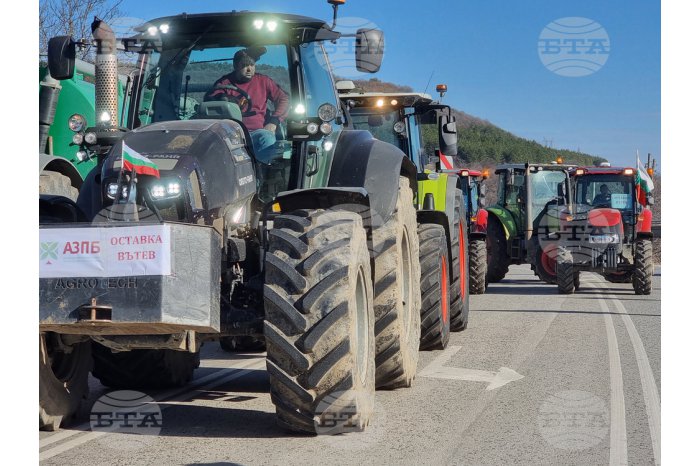Protesting Farmers Block Roads Across Bulgaria with Demands for Funding, Legislative Changes and Revision of Green Deal
07:49 | 07.02.2024 Category: International
Sofia, 7 feb. /BTA/. Grain producers and other farmers started indefinite protests on Tuesday, blocking roads across Bulgaria. The decision follows what the National Grain Producers Association concluded was an unsuccessful meeting with the Prime Minister and the Agriculture Minister on February 4. The demands range from financial support to legislative changes to revision in the Green Deal to eliminate clauses that farmers sees as deterimental to their business.
The protestors would not accept the government's offer for support to those who are able to prove that they made a loss in 2023. "Tax returns are submitted after March. As a matter of fact, they dont reflect the exact scale of losses of agricultural producers," said Simeon Simeonov, one of the protesting farmers.
The NGPA said the protests will continue until their demands are met, and threaten to increase the time of road blockages every day. On the first day, they lasted from 10 in the morning to noon.
Tractors and other farming machines blocked approaches to motorways and throroughfares at over 80 spots in all parts of the country. Police was there to make sure they don't get on motorways. The vehicles were then parked on the side of the road to wait for the next day of protests.
Traffic in the area of the Dunav Most border crossing between Bulgaria and Romania across the Danube was also blocked. Some 100 farmers with machines blocked the road betwen Mizia and Oryahovo which leads to the ferry service to Bechet in Romania.
Grain growers in Haskovo region said some 200 of them joined the protests.
The Bulgarian farmer needs legislative changes and relief of administrative burdens, Daniela Dimitrova, chairman of the Association of Grain Producers from Danube Dobrudzha, which is a key grain growing region in Bulgaria, told BTA. "This will reduce our production costs and make us competitive with our neighboring countries. The Green Deal raises our costs and prices are falling because of the war in Ukraine. We want to have only lease contracts in agriculture so that we can apply technologies and practices that reduce costs and give us security in our production. We want land rent regulated on the basis of costs and market prices. [...] We are all aware that if we are not united, we will be unable to hold up to the prices of other countries."
Tsanko Tsanev from the Association of Agricultural Producers told reporters that there may be some divisions among farmers at the moment but he expects everybody to unite in the coming days "because the problems of livestock farmers, grain producers, vegetable growers and fruit growers are the same and are rooted in the inadequate policy by the Ministry of Agriculture as regards the import of Ukrainian goods".
Prime Minister Nikolay Denkov told a news conference on Monday evening that he found the protest ill-grounded, saw a connection with the upcoming rotation in the government between Continue the Change-Democratic Bulgaria and GERB, and said that he expected to continue talks with the protestors in the coming days.
After the first day of protests, he told the press that the Government is ready with the main points in a new memorandum it will propose to the protesting farmers. “We are waiting for them to continue the conversation and finalize the agreement. The goal is clear: unblocking the process as quickly as possible, which will allow the government to support grain farmers who have suffered losses in 2023,” Denkov said.
The demands
The protestors are determined to protest until the following demands are met:
The five main crops in the grain production subsector (wheat, barley, maize, sunflower and rapeseed) should be included in the government aid scheme in support of farmers' liquidity to overcome the adverse economic impact of Russia's aggression against Ukraine in 2024 without affecting aid to other farming subsectors.
Legislative initiatives should be implemented to improve the conditions for agricultural activity. These initiatives should be aimed at: facilitating the conclusion of voluntary agreements for consolidated use of farm land; regulating the conclusion of long-term land lease agreements; adopting a state mechanism to regulate land lease payments, based on crop yields and selling prices; drafting and adopting laws on agricultural organizations, the agrarian chamber, and farmer cooperatives; declaring irrigation a strategic national priority and taking measures to upgrade irrigation farming (such as subsidizing water costs and relaxing the requirements for investing in water saving technologies).
The government should take a firm stance to protect Bulgarian producers when renegotiating the EU regulation on liberalized trade with Ukraine. It should avert a renewed risk to Bulgarian grain and essential oil crop production by making sure that the regulation sets out protective measures, licensing requirements and quotas for imported crops.
In connection with the environmental requirements in agriculture arising from the Green Deal, the Bulgarian government should work at the EU level to relax the green rules in the strategic plans for the development of agriculture and rural areas, which should include achieving a derogation in 2024 from the requirements about GAEC 7: Crop rotation and diversification, and GAEC 8: Minimizing the share of arable land designated for non-production purposes.
The government should push for equalizing the subsidies and the support for grain producers across the EU.

